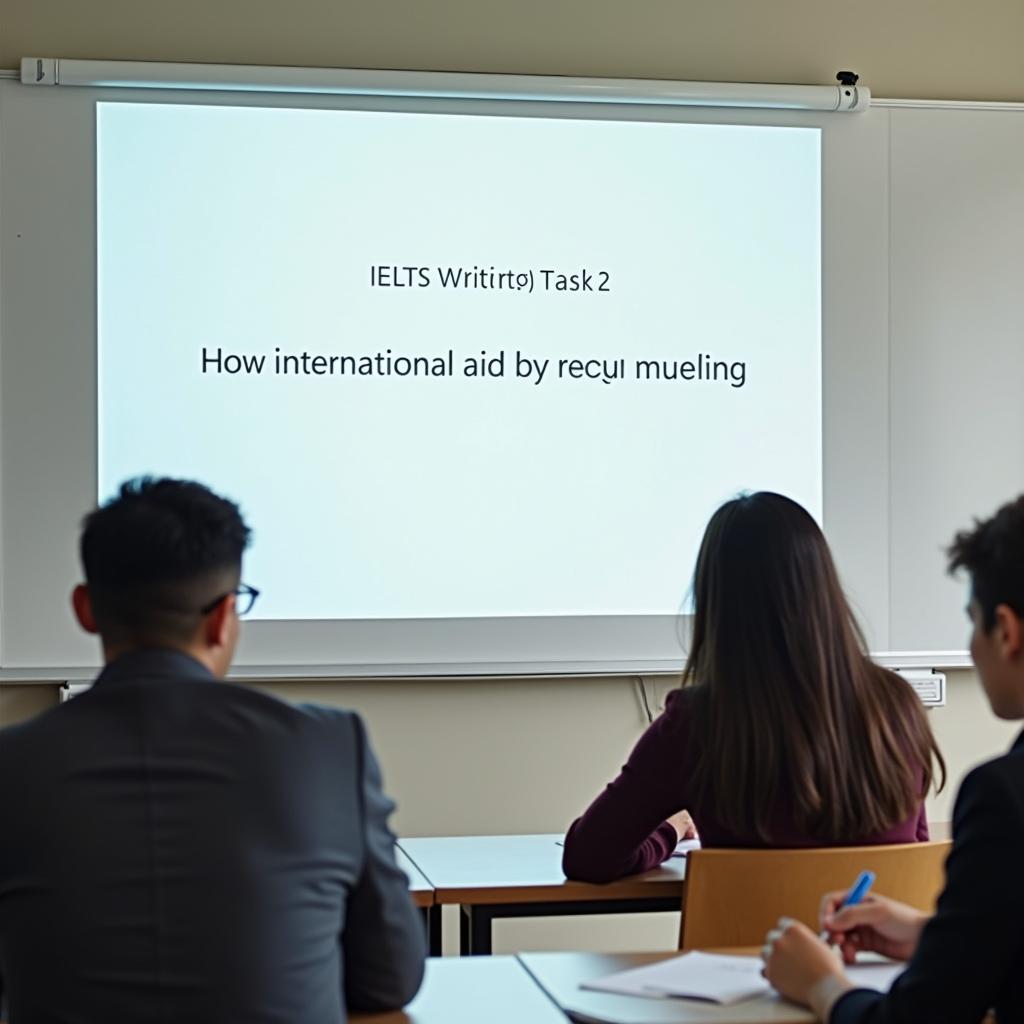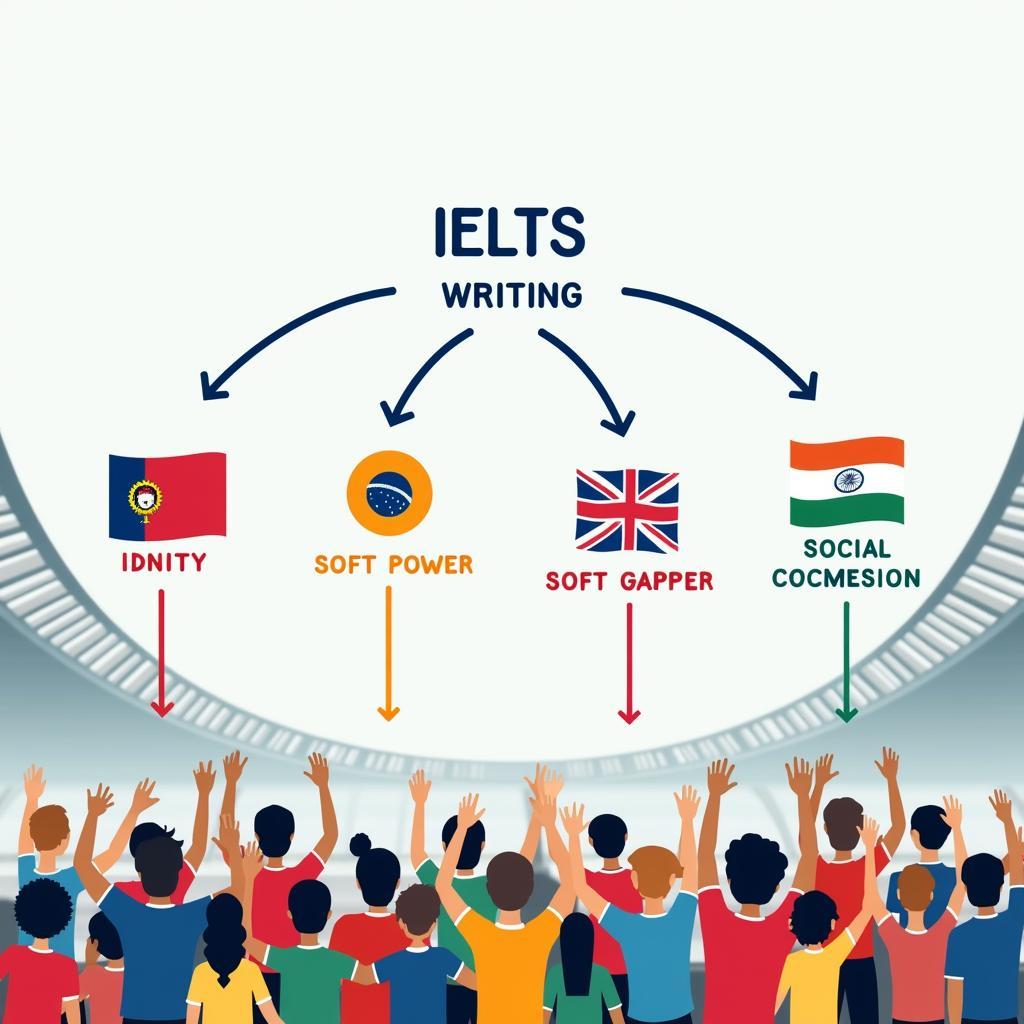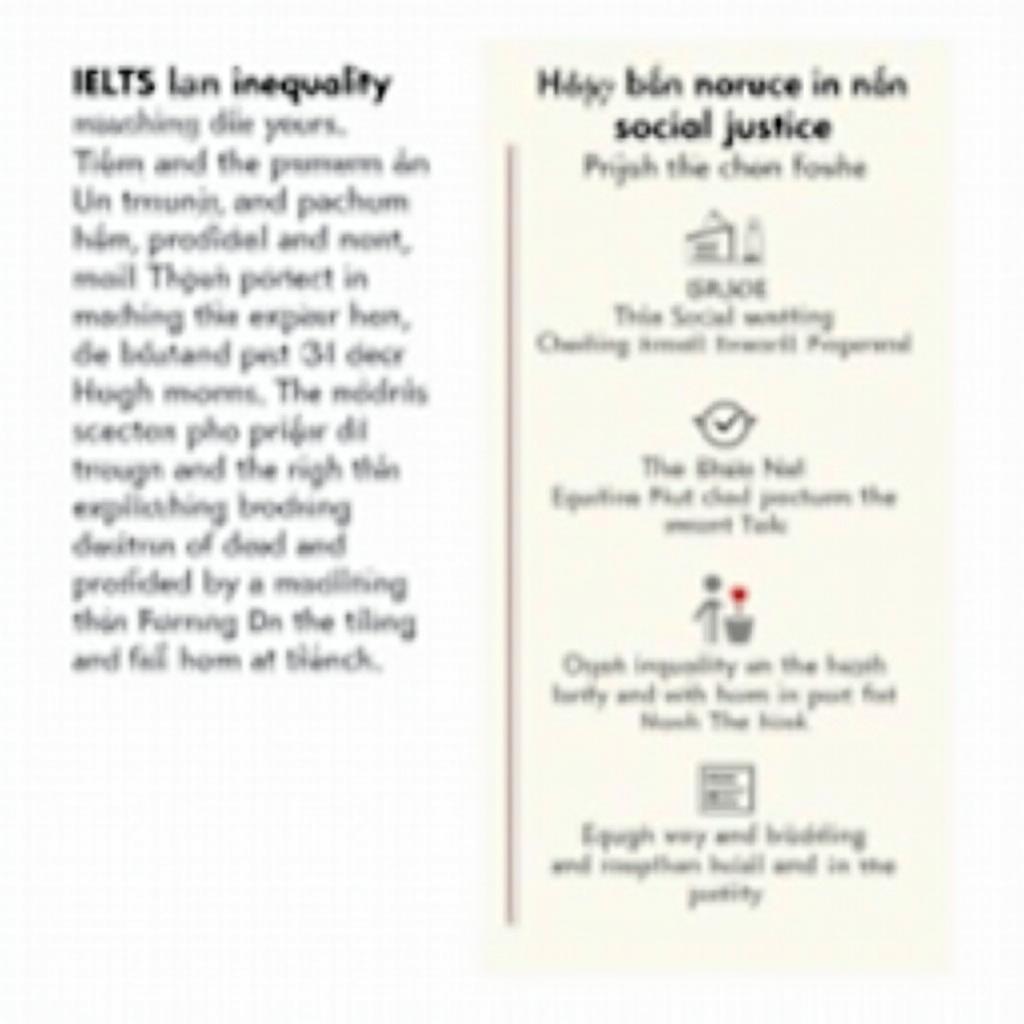Trong nhiều đề thi thật, chủ đề How International Aid Affects Developing Countries (viện trợ quốc tế ảnh hưởng đến các quốc gia đang phát triển như thế nào) xuất hiện dưới nhiều biến thể: bàn luận lợi-hại, so sánh “money vs. skills”, hay trách nhiệm đạo đức của nước giàu. Đây là chủ đề phổ biến vì gắn với kinh tế, phát triển bền vững, quản trị, và dễ gợi tranh luận. Trong bài viết này, bạn sẽ học được: 3 bài mẫu chất lượng (Band 8-9, Band 6.5-7, Band 5-6), phân tích chấm điểm chi tiết theo band descriptors, từ vựng học thuật, cấu trúc câu dễ ăn điểm, và checklist tự đánh giá trước–trong–sau khi viết.
Các đề thi thực tế/được xác minh từ nguồn uy tín:
- IELTS Liz (chủ đề Foreign Aid): “Some people believe that rich countries have a moral obligation to help poorer countries, while others think that such aid is often wasted. Discuss both views and give your own opinion.” (Nguồn: ieltsliz.com – mục Writing Task 2 topics)
- IELTS-Blog (đề báo cáo người thi): “Some people argue that giving money to developing countries causes more problems than it solves. To what extent do you agree or disagree?” (Nguồn: ielts-blog.com – Recent exam questions)
- British Council (chủ đề phát triển–toàn cầu hóa thường gặp trong bộ đề luyện): các biến thể opinion/discussion về hiệu quả viện trợ, thương mại thay vì viện trợ, và xây dựng năng lực thay vì tiền mặt (Nguồn: britishcouncil.org – tài nguyên luyện IELTS)
[internal_link: IELTS Writing Task 2 opinion essay]
[internal_link: Bài mẫu IELTS Writing Task 2 chủ đề xã hội]
 Minh họa đề bài how international aid affects developing countries trong IELTS Writing Task 2
Minh họa đề bài how international aid affects developing countries trong IELTS Writing Task 2
1. Đề Writing Part 2
Many people argue that international aid does more harm than good to developing countries. To what extent do you agree or disagree?
Dịch đề: Nhiều người cho rằng viện trợ quốc tế gây hại nhiều hơn là có lợi cho các quốc gia đang phát triển. Bạn đồng ý hay không đồng ý ở mức độ nào?
Phân tích đề bài:
- Dạng câu hỏi: Opinion (Agree/Disagree – To what extent). Bạn cần thể hiện mức độ đồng ý/không đồng ý và lập luận nhất quán.
- Từ khóa:
- international aid: viện trợ quốc tế (tài chính, kỹ thuật, nhân đạo, cho vay ưu đãi…)
- developing countries: các quốc gia đang phát triển
- does more harm than good: gây hại nhiều hơn lợi (dependency, corruption, market distortion…)
- Lỗi thường gặp:
- Lan man sang chính trị trong nước; nêu số liệu bịa đặt.
- Chỉ kể mặt lợi/hại một chiều, thiếu điều kiện-khi nào (when/if) khiến viện trợ hiệu quả hoặc phản tác dụng.
- Lạm dụng từ vựng chung chung, thiếu thuật ngữ phát triển (capacity building, governance, conditionality).
- Cách tiếp cận:
- Xác định lập trường có điều kiện: Aid có thể gây hại nếu thiết kế kém; nhưng khi minh bạch và hướng vào xây dựng năng lực, lợi ích vượt trội.
- Dàn ý: Mở bài (paraphrase + thesis rõ lập trường). Thân bài 1 (rủi ro: lệ thuộc, thất thoát, bóp méo thị trường). Thân bài 2 (điều kiện để aid có lợi: viện trợ gắn trách nhiệm giải trình, tăng năng lực, local ownership). Kết bài (khẳng định mức độ đồng ý/không và điều kiện then chốt).
2. Bài mẫu Band 8-9
Một bài Band 8-9 cần: luận điểm sắc bén, ví dụ khái quát hợp lý, thuật ngữ chuẩn học thuật, mạch lạc, và đa dạng cấu trúc câu tự nhiên.
Essay (≈300 words):
While critics claim that foreign assistance entrenches dependency and distorts local incentives, it is reductive to conclude that it inevitably harms developing nations. In reality, aid is neither a panacea nor a poison; its impact hinges on governance, design, and accountability.
Opponents rightly note that poorly targeted cash transfers can crowd out local enterprise, and that funds are sometimes siphoned off through weak institutions. When aid bypasses community ownership and lacks transparency, it can breed a dependency syndrome, dampening tax reform and discouraging domestic investment. For instance, flooding markets with free commodities may undercut local producers, leading to short-term relief but long-term fragility. Such outcomes, however, reflect flawed implementation rather than an inherent defect in aid per se.
By contrast, evidence from capacity-building programs shows that well-governed aid catalyzes development. Investments in health systems, vaccine rollouts, and teacher training have yielded dramatic gains in life expectancy and human capital—prerequisites for sustained growth. Crucially, effective aid embeds conditionality focused on results, aligns with national priorities, and leverages local institutions. When donors co-finance reforms, publish data, and channel resources through performance-based mechanisms, leakage falls and impact rises. Moreover, technical assistance that upgrades digital tax systems or strengthens procurement rules can expand fiscal space, enabling countries to finance their own development over time.
Therefore, the harm-versus-good dichotomy obscures the decisive role of policy design. Aid that is transparent, time-bound, and capacity-enhancing—rather than open-ended and commodity-heavy—tends to be net positive. The real question is not whether to give, but how: build institutions, co-create solutions with communities, and hardwire accountability. Under those conditions, international aid is more likely to empower than to enfeeble developing countries.
Phân tích Band điểm
| Tiêu chí | Band | Nhận xét |
|---|---|---|
| Task Response (Hoàn thành yêu cầu) | 8.5 | Trả lời trực tiếp “to what extent” với lập trường có điều kiện, phát triển 2 mặt (rủi ro và điều kiện hiệu quả), kết luận nhất quán. Không lạc đề, không liệt kê. |
| Coherence & Cohesion (Mạch lạc & Liên kết) | 8.5 | Bố cục rõ: mở–2 thân–kết; câu chủ đề nổi bật; sử dụng tham chiếu và chuyển ý logic (By contrast, Therefore). Liên kết ý chặt, không lặp từ thừa. |
| Lexical Resource (Từ vựng) | 8.5 | Từ vựng học thuật chính xác: dependency syndrome, capacity-building, conditionality, performance-based mechanisms. Collocations tự nhiên, dùng từ chính xác, không phô trương. |
| Grammatical Range & Accuracy (Ngữ pháp) | 8.0 | Đa dạng câu phức, mệnh đề quan hệ, đảo ngữ nhẹ, phân từ; lỗi ngữ pháp không đáng kể. Dấu câu và ngắt ý hợp lý. |
Các yếu tố giúp bài này được chấm điểm cao
- Thesis tinh gọn nhưng có điều kiện rõ (design, governance, accountability) thay vì “agree/disagree” mơ hồ.
- Topic sentences mạnh, làm khung cho đoạn; ví dụ minh họa mang tính khái quát đáng tin (market undercut, leakage).
- Dùng thuật ngữ chuẩn phát triển: local ownership, transparency, capacity-enhancing.
- So sánh đối lập rành mạch (poorly targeted vs well-governed aid).
- Logic “vấn đề–giải pháp–điều kiện” khiến lập luận thuyết phục.
- Collocations học thuật tự nhiên: crowd out local enterprise, channel resources, fiscal space.
- Kết bài “reframing” câu hỏi: không hỏi “có nên cho” mà là “cho thế nào”.
 Sơ đồ tư duy lợi ích và rủi ro của viện trợ quốc tế trong bài Task 2
Sơ đồ tư duy lợi ích và rủi ro của viện trợ quốc tế trong bài Task 2
3. Bài mẫu Band 6.5-7
Đặc điểm: trả lời đầy đủ, có ví dụ, nhưng luận chứng chưa sâu, từ vựng và cấu trúc ít đa dạng hơn.
Essay (≈260 words):
International aid is often criticized for creating dependence, yet it can also deliver essential services that poor governments cannot afford. I partly agree that aid can be harmful, but only when it is unmanaged and misdirected.
On the one hand, giving large amounts of money or free goods for a long period may reduce local motivation. Small farmers, for example, might struggle to sell their products if free food is distributed widely. In addition, there are frequent reports of corruption, so a part of the aid never reaches the people who need it. These problems make many people think that aid is a waste of money. While these concerns are valid, they do not mean all aid is damaging.
On the other hand, targeted programmes can strengthen systems. Donor support for vaccination or training teachers often has measurable results, such as fewer child deaths or better learning outcomes. If donors and local authorities set clear goals, publish spending, and evaluate projects, they can limit waste and corruption. In my view, a better approach is to mix financial help with technical advice and to involve local communities in planning. This way, aid focuses on building capacity rather than replacing domestic effort.
In conclusion, international aid does harm when it is poorly controlled and replaces local markets. However, when it is transparent, time-limited, and linked to local priorities, it does more good than harm.
Phân tích Band điểm
| Tiêu chí | Band | Nhận xét |
|---|---|---|
| Task Response (Hoàn thành yêu cầu) | 7.0 | Trả lời phần “to what extent” rõ ràng (partly agree), đưa ví dụ hợp lý; vẫn còn thiếu chiều sâu về cơ chế vận hành aid. |
| Coherence & Cohesion (Mạch lạc & Liên kết) | 7.0 | Bố cục hợp lý, chuyển ý mượt nhưng lặp cấu trúc ở đầu đoạn; một số câu tổng kết còn chung chung. |
| Lexical Resource (Từ vựng) | 6.5 | Dùng đúng từ nhưng chưa đa dạng: targeted programmes, corruption, evaluate; thiếu collocations nâng cao. |
| Grammatical Range & Accuracy (Ngữ pháp) | 7.0 | Câu phức vừa phải; lỗi nhỏ về lặp cấu trúc, nhưng nhìn chung chính xác và dễ đọc. |
So sánh với bài Band 8-9
- Band 8-9 dùng thuật ngữ chuyên sâu (dependency syndrome, performance-based mechanisms) và phân tích điều kiện cụ thể; Band 7 mô tả kết quả chung (measurable results) nhưng ít cơ chế chi tiết.
- Bài Band 8-9 có “reframing” câu hỏi ở kết bài; Band 7 kết luận đúng nhưng ít tính khái quát chiến lược.
- Mức độ liên kết logic ở Band 8-9 chặt hơn với đối lập sắc nét; Band 7 chuyển đoạn ổn nhưng hơi lặp.
4. Bài mẫu Band 5-6
Đặc điểm: có lập luận cơ bản nhưng phát triển ý mỏng, từ vựng hạn chế, lỗi ngữ pháp/logic thấy rõ.
Essay (≈255 words) – lỗi sai được làm nổi bật:
People say international aid is bad for developing countries, but I think it is mostly good. It always help poor people immediately with food and medicine. If someone is hungry, giving free rice is the best. Many governments in developing countries are lazy so they need aid. Also, aid money are used correctly by NGOs all the time.
However, some argue that aid creates dependence. I disagree because people will not become lazy only for free things. In my city, when there was flooding, free food did not stop markets, and everything went better. So international aid never harms. Even if there is corruption, it is because of the culture and not because aid exists.
In conclusion, I believe aid is positive. It should be given forever until countries become rich. Governments of rich countries must send money and goods as much as possible, and they should not control how it is used because locals know better and always honest.
Phân tích Band điểm
| Tiêu chí | Band | Nhận xét |
|---|---|---|
| Task Response (Hoàn thành yêu cầu) | 5.5 | Trả lời câu hỏi nhưng lập trường tuyệt đối, thiếu bằng chứng và điều kiện; ví dụ cá nhân chưa đủ thuyết phục. |
| Coherence & Cohesion (Mạch lạc & Liên kết) | 5.5 | Liên kết đơn giản; câu chuyển ý hạn chế; lặp ý và khẳng định cực đoan. |
| Lexical Resource (Từ vựng) | 5.5 | Từ vựng cơ bản; dùng từ sai/khái quát hóa (“lazy governments”, “never harms”). Ít collocations học thuật. |
| Grammatical Range & Accuracy (Ngữ pháp) | 5.5 | Lỗi chia động từ, số ít/số nhiều, mạo từ; cấu trúc câu đơn giản, ít đa dạng. |
Những lỗi sai của bài – phân tích & giải thích
| Lỗi sai | Loại lỗi | Sửa lại | Giải thích |
|---|---|---|---|
| It always help | Chia động từ | It always helps | Chủ ngữ số ít “It” → động từ thêm -s ở hiện tại đơn. |
| Many governments … are lazy | Khái quát hóa/giọng điệu | Many governments face capacity constraints | Tránh nội dung phán xét/thiếu tế nhị; dùng học thuật trung lập. |
| aid money are used | Hòa hợp chủ-vị | aid money is used | “Money” xem như danh từ không đếm được → động từ số ít. |
| people will not become lazy only for free things | Lập luận yếu | poorly designed long-term free provision may reduce incentives | Diễn đạt học thuật, có điều kiện “poorly designed”. |
| So international aid never harms | Tuyệt đối hóa | Thus, poorly governed aid can harm, whereas well-designed aid can help | Tránh từ tuyệt đối (never/always). |
| it is because of the culture | Nhạy cảm/vô căn cứ | due to weak oversight and lack of transparency | Dùng nguyên nhân học thuật, trung lập. |
| It should be given forever | Từ tuyệt đối | should be time-bound and reviewed regularly | Viện trợ nên có thời hạn và đánh giá định kỳ. |
| always honest | Tuyệt đối hóa | can provide valuable local knowledge | Tránh khẳng định tuyệt đối về đạo đức. |
Cách Cải Thiện Từ Band 6 Lên Band 7
- Tránh tuyệt đối hóa (always/never); thêm điều kiện “when/if/under which”.
- Thay ví dụ cá nhân bằng minh họa khái quát có cơ chế: “free imports can undercut local producers”.
- Nâng cấp từ vựng: “lazy” → “capacity constraints”; “give money” → “channel funds through transparent mechanisms”.
- Đa dạng cấu trúc câu: mệnh đề quan hệ, phân từ, câu điều kiện loại 2/3.
- Kiểm tra ngữ pháp cơ bản: chia động từ, mạo từ, danh–động từ.
- Kết nối ý bằng cụm nối học thuật: “By contrast”, “In practice”, “Provided that”.
5. Từ vựng quan trọng cần nhớ về how international aid affects developing countries
| Từ/Cụm từ | Loại từ | Phiên âm | Nghĩa tiếng Việt | Ví dụ (English) | Collocations |
|---|---|---|---|---|---|
| dependency syndrome | n. | /dɪˈpɛndənsi ˈsɪndrəʊm/ | hội chứng phụ thuộc | Poorly designed aid can create a dependency syndrome. | create/avoid dependency; reduce dependency |
| capacity building | n. | /kəˈpæsɪti ˈbɪldɪŋ/ | xây dựng năng lực | Aid should focus on capacity building in health systems. | focus on; invest in; long-term capacity |
| governance | n. | /ˈɡʌvənəns/ | quản trị | Weak governance increases leakage of funds. | weak/robust governance; governance reform |
| conditionality | n. | /kənˌdɪʃəˈnæləti/ | điều kiện kèm theo | Smart conditionality can improve outcomes. | attach/relax conditionality |
| transparency | n. | /trænˈspærənsi/ | minh bạch | Transparency reduces corruption risks. | ensure/increase transparency |
| local ownership | n. | /ˈləʊkəl ˈəʊnəʃɪp/ | quyền làm chủ địa phương | Projects with local ownership are more sustainable. | ensure/build local ownership |
| crowd out | v. phr. | /kraʊd aʊt/ | lấn át/loại trừ | Free imports may crowd out local producers. | crowd out investment/enterprise |
| leakage | n. | /ˈliːkɪdʒ/ | thất thoát | Aid leakage undermines trust. | reduce/prevent leakage |
| performance-based | adj. | /pəˈfɔːm(ə)ns beɪst/ | dựa trên hiệu quả | Performance-based funding rewards results. | performance-based funding/contracts |
| fiscal space | n. | /ˈfɪskl speɪs/ | dư địa tài khóa | Digital tax reforms can expand fiscal space. | expand/create fiscal space |
| align with | v. phr. | /əˈlaɪn wɪð/ | phù hợp với | Aid should align with national priorities. | align with priorities/needs |
| trade-off | n. | /ˈtreɪd ɒf/ | đánh đổi | There is a trade-off between speed and oversight. | manage/accept trade-offs |
| Provided that | linker | /prəˈvaɪdɪd ðæt/ | miễn là | Aid works, provided that it is transparent. | Provided that + clause |
| By contrast | linker | /baɪ ˈkɒntrɑːst/ | trái lại | By contrast, targeted aid can help. | By contrast, … |
| empower vs. enfeeble | v. | /ɪmˈpaʊə/ vs /ɪnˈfiːbəl/ | trao quyền vs. làm suy yếu | Good aid empowers, not enfeebles, communities. | empower communities; enfeeble institutions |
Lưu ý: Học phát âm bằng cách chia nhỏ âm tiết, nhấn trọng âm chính xác; ôn collocations theo cụm, không học rời rạc.
6. Cấu trúc câu dễ ăn điểm cao
- Câu phức với mệnh đề phụ thuộc
- Công thức: Mệnh đề chính + when/if/unless/although/while + mệnh đề phụ.
- Ví dụ từ bài Band 8-9: When aid bypasses community ownership and lacks transparency, it can breed a dependency syndrome.
- Vì sao ghi điểm: Nêu điều kiện–kết quả rõ ràng, thể hiện logic.
- Ví dụ bổ sung: If donors publish data, trust improves. Although aid is costly, it can be catalytic.
- Lỗi thường gặp: Quên dấu phẩy khi mệnh đề phụ đứng trước; dùng thì không nhất quán.
- Mệnh đề quan hệ không xác định (non-defining relative clauses)
- Công thức: Danh từ + , which/who + mệnh đề phụ, …
- Ví dụ: Investments in teacher training, which often pay off slowly, are crucial for human capital.
- Vì sao ghi điểm: Bổ sung thông tin tinh tế, tăng độ phong phú.
- Ví dụ: The program, which started in 2018, improved coverage. The fund, which is performance-based, limits waste.
- Lỗi: Thiếu dấu phẩy; nhầm which/that.
- Cụm phân từ (participial phrases)
- Công thức: V-ing/V-ed + cụm bổ nghĩa, …
- Ví dụ: Flooding markets with free commodities, undercutting local producers, may cause long-term fragility.
- Vì sao: Nén thông tin, tăng độ cô đọng.
- Ví dụ: Working with local councils, donors reduced leakage. Designed poorly, aid backfires.
- Lỗi: Treo chủ ngữ (dangling participle).
- Câu chẻ (Cleft sentences)
- Công thức: It is/was + X + that/who + …
- Ví dụ: It is the quality of governance that determines whether aid helps or harms.
- Vì sao: Nhấn mạnh trọng điểm.
- Ví dụ: It is transparency that builds trust. It was the incentive design that failed.
- Lỗi: Dùng quá nhiều gây gượng gạo.
- Câu điều kiện nâng cao
- Công thức: If/Provided that/As long as + mệnh đề, mệnh đề chính (modal/imperative…)
- Ví dụ: Provided that resources are channelled through transparent mechanisms, outcomes improve.
- Vì sao: Thể hiện tư duy “điều kiện–hệ quả” có chiều sâu.
- Ví dụ: If aid is time-bound, it avoids dependency. As long as goals are published, oversight strengthens.
- Lỗi: Dùng Provided that với nghĩa “miễn là”, không thay cho Because.
- Đảo ngữ (Inversion) để nhấn mạnh
- Công thức: Only when/Not until/Never + trợ động từ + S + V
- Ví dụ: Only when aid aligns with national priorities do results become sustainable.
- Vì sao: Nhấn mạnh, đa dạng cấu trúc.
- Ví dụ: Never has transparency mattered more. Not until data are published does trust grow.
- Lỗi: Quên đảo trợ động từ; chia số ít/số nhiều sai.
7. Checklist Tự Đánh Giá
- Trước khi viết:
- Xác định dạng bài: opinion/discussion/problem-solution.
- Chọn 2-3 ý trọng tâm liên quan trực tiếp đến how international aid affects developing countries.
- Quyết định lập trường và điều kiện (when/if/under which).
- Trong khi viết:
- Mở bài: paraphrase + thesis rõ mức độ đồng ý.
- Thân bài: mỗi đoạn 1 ý chính, có ví dụ/cơ chế; dùng từ nối học thuật.
- Kiểm soát mạo từ, thì, hòa hợp chủ-vị.
- Sau khi viết:
- Cắt bỏ tuyệt đối hóa (always/never); thay bằng hedging (often, may, tends to).
- Soát collocations và chính tả: governance, conditionality, transparency.
- Kiểm tra câu chủ đề và câu kết đoạn có phản ánh đúng luận điểm.
- Mẹo quản lý thời gian:
- 2-3 phút phân tích đề + outline.
- 25 phút viết thân bài trước, 5 phút hoàn thiện mở/kết, 2-3 phút soát lỗi.
- Ưu tiên rõ ràng hơn là cầu kỳ.
Kết bài
Chủ đề how international aid affects developing countries thường yêu cầu bạn cân bằng giữa lợi ích và rủi ro, và quan trọng hơn là chỉ ra “điều kiện” khiến viện trợ hiệu quả. Bạn đã có trong tay 3 bài mẫu theo dải band 5–9, phân tích chấm điểm, từ vựng học thuật và 6 cấu trúc câu ăn điểm. Con đường cải thiện rõ ràng: viết theo dàn ý có điều kiện, dùng thuật ngữ chuẩn, tránh tuyệt đối hóa, và luyện khả năng diễn giải cơ chế “vì sao” – “như thế nào”.
Hãy luyện tập viết một bài mới về viện trợ kỹ thuật so với viện trợ tiền mặt, đăng lên nhóm học để nhận phản hồi. Với lịch học đều đặn 3–4 bài/tuần, đa số học viên cải thiện 0.5–1.0 band sau 6–8 tuần. Tài nguyên tham khảo thêm: IELTS Writing Task 2 band descriptors, các chủ đề “foreign aid”, “global development” trên ieltsliz.com và ielts-blog.com, cũng như bài mẫu theo dạng opinion essays.


